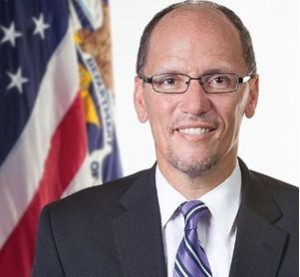WASHINGTON — Today, the U.S. Department of Labor (DOL) issued final regulations implementing President Obama’s executive order on Fair Pay and Safe Workplaces. Among its provisions, the regulations will help to ensure companies contracting with the federal government comply with non-discrimination protections based on sexual orientation and gender identity.

“Federal contracts should deliver value for taxpayers in a way that is consistent with our nation’s values,” said U.S. Secretary of Labor Thomas E. Perez. “Contractors that illegally cut corners at the expense of their workers should not benefit from taxpayer-funded federal contracts. At the same time, employers who meet their legal responsibilities should not have to compete with those who do not. The regulations and guidance we are announcing today seek to ensure a level playing field for contractors and workers alike.”
“With these regulations, the Department of Labor is implementing President Obama’s executive order that helps provide crucial non-discrimination protections to employees of companies contracting with the federal government,” said HRC Government Affairs Director David Stacy. “All workers, regardless of their sexual orientation or gender identity, deserve to be able to go to work and make a living free from unfair and unjust discrimination. These regulations will level the playing field for companies that play by the rules and know that equal opportunity and non-discrimination protections are good for business. They will also help ensure taxpayer funds are not used to unlawfully discriminate against LGBTQ people.”
In July 2014, President Obama signed the executive order providing additional protections for workers employed by companies doing business with the federal government. By including new evaluation and enforcement mechanisms for reporting and remedying violations of existing labor requirements, that executive order bolstered the impact of the President’s previous landmark executive order that banned discrimination by federal contractors on the basis of sexual orientation and gender identity.
Companies bidding for federal contracts in excess of $500,000 will be required to publicly report any violations of existing labor laws over the previous three years. Once a company enters into a contract with the federal government, it will also be required to update this public report regarding potential labor law violations every six months for all contracted and subcontracted work. If violations have occurred, the executive order and DOL regulations provide a process for remedial and corrective action.
The regulations also provide additional protections for employees of companies contracting with the federal government. Among these protections, workers can no longer be required to sign arbitration agreements that allow an arbitrator — rather than a judge — to make binding decisions on sexual assault and civil rights complaints. This requirement preserves the rights of some of the most vulnerable workers and ensures that they will have a right to take formal civil steps to hold companies accountable when they experience these grievances.
While these regulations will help protect employees of companies contracting with the federal government, the existing patchwork of legal protections for LGBTQ people in the United States as a whole leaves millions subject to uncertainty and at risk of discrimination. There is no federal law explicitly protecting LGBTQ people from discrimination, and 31 states still lack fully-inclusive non-discrimination protections for LGBTQ people. That’s why HRC is working with advocates and lawmakers to pass the Equality Act in Congress, as well as strong non-discrimination protections at the state and local levels. The Equality Act would finally guarantee explicit protections for LGBTQ people under our nation’s existing civil rights laws. It would provide clear, permanent, and equal protections under federal law for all Americans in vital areas of life, including employment, access to public spaces, housing, credit, education, jury service, and federally-funded programs.











